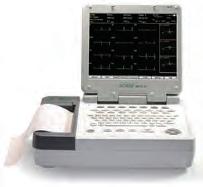Choosing the Perfect ECG Machine for Hospitals

1. Understanding the different types of ECG machines
When it comes to choosing the perfect ECG machine for hospitals,
it is crucial to understand the different types available in the market. Each
type of ECG machine made by ECG
Machine Manufacturers has its own set of features and
functionalities, catering to specific needs and requirements. 1. Resting ECG
Machines: These are the most common type of ECG machines used in hospitals.
They are designed to record the patient's heart activity while at rest. Resting
ECG machines are typically compact and portable, allowing for easy mobility
between different hospital departments or even for home healthcare purposes.
They provide accurate and reliable readings, making them suitable for routine
examinations and screenings. 2. Stress ECG Machines: Also known as exercise ECG
machines or treadmill ECG machines, these devices are used to monitor the
patient's heart activity while they are undergoing physical stress or exercise.
They are equipped with features such as treadmills or stationary bicycles,
allowing for controlled exertion while recording the ECG. Stress ECG machines
are commonly used to detect heart abnormalities that may not be visible during
resting conditions. 3. Holter Monitors: Holter monitors are ECG devices that
are worn by the patient for an extended period, usually 24 to 48 hours. They
continuously record the heart activity, providing a comprehensive analysis of
the patient's heart rhythm throughout the day. Holter monitors are particularly
useful for diagnosing intermittent or sporadic heart conditions that may not be
captured during a short-term ECG recording. 4. Portable ECG Monitors: As the
name suggests, portable ECG monitors are lightweight and compact devices that
are designed for easy use outside of the hospital setting. They are typically
used for patient monitoring during ambulatory care or remote healthcare
services. Portable ECG monitors are equipped with wireless connectivity,
allowing the data to be transmitted to a central monitoring system or
healthcare professional for analysis.
2. Assessing the technical specifications and features
When it comes to choosing the perfect ECG machine for hospitals,
assessing the technical specifications and features is a crucial step. The
technical specifications of an ECG machine built by ECG Machine Manufacturers can
greatly impact its functionality and performance, making it essential to
thoroughly evaluate these factors before making a purchase. One key factor to
consider is the number of channels the ECG machine offers. A higher number of
channels allows for a more comprehensive examination, enabling multiple leads
to be recorded simultaneously. This can be particularly beneficial when dealing
with complex cardiac conditions or when conducting advanced diagnostic tests.
Another important consideration is the frequency response range of the machine.
The wider the range, the more accurate and detailed the recordings will be.
This is especially vital for detecting subtle abnormalities in the heart's
electrical activity. Additionally, the sampling rate should be taken into
account, as a higher sampling rate ensures more precise waveform capture. Ease
of use and user-friendly features are also essential. Look for an ECG machine
with an intuitive interface, clear display, and straightforward navigation.
This will enable healthcare professionals to quickly and efficiently operate
the device, saving valuable time during critical situations. Furthermore, it is
crucial to assess the connectivity options provided by the ECG machine. Look
for models that offer seamless integration with existing hospital systems, such
as electronic medical records (EMR) or picture archiving and communication
systems (PACS). This ensures smooth data transfer, enhances workflow efficiency
and promotes better patient care.
3. Considering ease of use and user interface
When it comes to choosing the perfect ECG machine from ECG
Machine Suppliers for
hospitals, ease of use and user interface are two key factors that should not
be overlooked. In a busy hospital setting, medical professionals need equipment
that is intuitive and easy to operate, allowing them to efficiently monitor and
diagnose patients. A user-friendly interface is essential to ensure that
healthcare professionals can navigate the ECG machine easily, without wasting
precious time trying to figure out complex menus or functions. The interface
should be clear and well-organized, with easily identifiable buttons and a
logical layout. This can greatly enhance workflow and reduce the chances of
errors or misinterpretations. Additionally, the ease of use extends beyond just
the physical interface. The ECG machine should offer quick and seamless data
entry options, such as touchscreens or keyboard shortcuts, to speed up the
process of recording patient information.
4. Compatibility with existing systems and integration
capabilities
When choosing the perfect ECG machine from an ECG
Machine Supplier for hospitals, one crucial factor to consider is
its compatibility with existing systems and integration capabilities. Hospitals
already have a multitude of systems and technologies in place, including
electronic health records (EHR) and other diagnostic equipment. It is essential
to ensure that the ECG machine can seamlessly integrate with these existing
systems to streamline workflow and improve efficiency. Compatibility with
existing systems enables the ECG machine to communicate and exchange data with
other medical devices and software. This integration allows for a more
comprehensive patient profile, as ECG results can be correlated with other
diagnostic information. For example, the ECG data can be automatically linked
to the patient's electronic health record, providing a comprehensive view of
their medical history and aiding in accurate diagnosis.
Comments